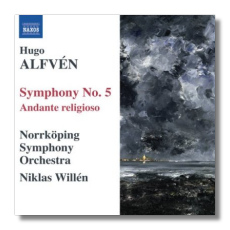
The Internet's Premier Classical Music Source
Related Links
- Alfvén Reviews
- Latest Reviews
- More Reviews
-
By Composer
-
Collections
DVD & Blu-ray
Books
Concert Reviews
Articles/Interviews
Software
Audio
Search Amazon
Recommended Links
Site News
 CD Review
CD Review
Hugo Alfvén

Symphonies, Volume 4
- Symphony #5 in A minor, Op. 54
- Andante religioso
Norrköping Symphony Orchestra/Niklas Willén
Naxos 8.557612 DDD 57:47
Swedish composer Hugo Alfvén (1872-1960) composed five symphonies. Naxos already has released CDs of the earlier symphonies, with Niklas Willén conducting the Royal Scottish National Orchestra (Nos. 1 and 3), the National Symphony Orchestra of Ireland (#2), and the Iceland Symphony Orchestra (#4), and it is good to see them bringing the project back to Sweden with this CD. I believe that this is only the second recording of the complete Fifth Symphony. Previously, it was available from BIS, with Neeme Järvi and the Royal Stockholm Philharmonic Orchestra.
Alfvén began this symphony in 1942. It took him more than a decade to complete it, and after the 1953 première he withdrew it for further revisions. When it reappeared in 1958, he still was unsatisfied with the last two movements, but of course there was little that he could do about it, as he died two years later. (Sometimes the symphony's nearly 20-minute opening movement is performed and recorded on its own.)
In spite of this, the symphony is an immediately appealing work, and the reasons for its neglect are unclear to me. Its worst fault, if one can call it a fault at all, is its inconsistency – not in quality, but in style. Mahler once said that the symphony must embrace everything, and that it must be like the world. At times, Alfvén's late-Romantic symphony embraces the spirit of Mahler himself, if not the letter. Try, for example, the third movement, in which the musical flow is interrupted by a morbidly humorous xylophone. Much of the opening movement reminds me of the symphonies by Franck and Chausson, particularly in the cut of its melodies. Often the mood turns heroic, and then this symphony reminds me not only of Franck's sole work in this genre, but also Scriabin's Second Symphony. Throughout, there are many good and memorable melodies, and an imaginative, sensitive use of the orchestra.
The short (3:49 here) Andante religioso is taken from the earlier Revelation Cantata, composed in 1913. Scored for harp, celesta, and strings, it quickly establishes a mood of sweet devotion that is not allowed to turn saccharine. It deserves to be heard more frequently as well.
I've heard only part of Järvi's cycle, yet I feel comfortable in recommending the present disc, because the orchestra plays the music confidently, and Naxos' engineering is spectacular. (Plus, a Naxos CD is about half the price of a BIS CD.) The interpretation and execution suggest a full-price CD in every way, so I consider this disc a bargain.
Copyright © 2007, Raymond Tuttle




















